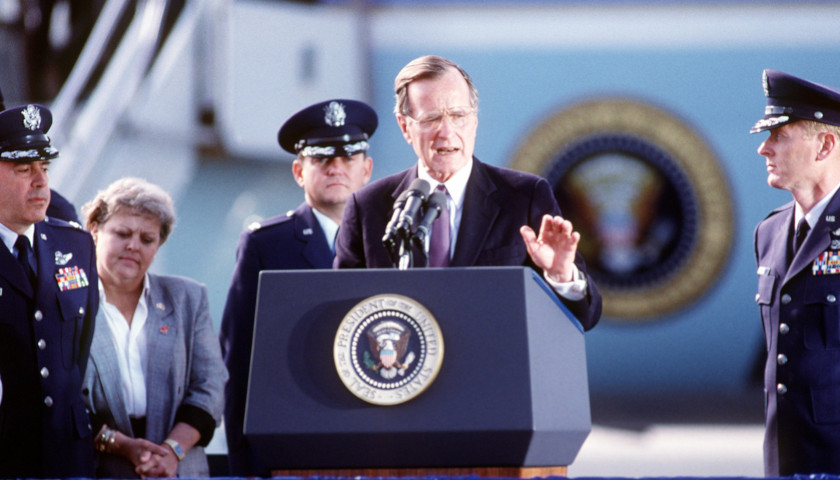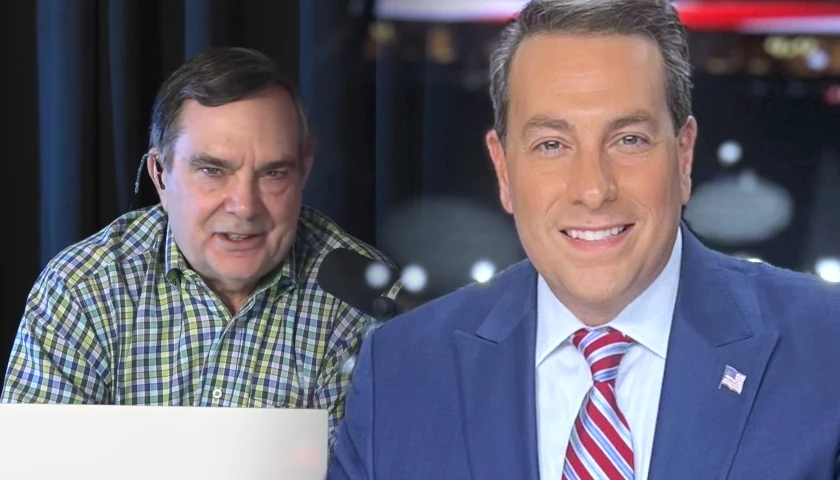by Richard A Viguerie
George H. W. Bush’s relationship with conservatives may be best illustrated by his response to a CBS television interview Howard Phillips and I had with Dan Rather at the 1984 Republican National Convention.
We pounded Bush for his lack of commitment to conservative principles and what we saw as his “inside the White House” fifth column against Reaganism.
The following evening, Rather interviewed Bush and said in so many words, “Mr. Vice President, last night I had Richard Viguerie and Howard Phillips on the show, and they say you’re not a conservative. Mr. Vice President, are you a conservative?” Bush replied, “Yes, Dan, I’m a conservative, but I’m not a nut about it.”
I’m proud to say that I was then and am now a “nut” about liberty. It was later shown that what George H. W. Bush was a nut about was growing government, and driving all conservatives out of the White House, the executive branch of the federal government, and the Republican Party.
Mr. Bush’s lengthy resume was accumulated largely by being selected for posts by his establishment friends and those with whom he allied himself – he was never an agent of conservative change, rather, he was a stabilizing force to keep government aligned with establishment goals.
Nowhere was this more evident than in his influence on President Ronald Reagan and the Reagan White House.
As I explained in my book TAKEOVER, as Vice President, George H. W. Bush came to the White House with an extensive Rolodex of progressive establishment Republican friends and contacts whom he worked hard to place in key positions in the government—starting with his campaign manager and fellow Texan, James Baker, as chief of staff at the White House. With Jim Baker in that key role, it became that much harder to place movement conservatives in other policy-making positions in the government.
Vice President Bush, Senator Howard Baker, Congressman Bob Michel, and the rest of the establishment Republicans in Washington weren’t necessarily bad people, but their lack of commitment to the conservative principles that Reagan ran on, and that grassroots conservatives expected the GOP to deliver on, meant that the debate that went on in the Republican primaries between Big Government Republicans and the Reaganites who wanted to shrink government never really ended.
However, it is a tribute to Bush’s political instincts (or perhaps more correctly the political instincts of the late Lee Atwater) that while George H.W. Bush was no conservative, to win the presidency he was more than happy to run as a conservative.
In 1988 George H.W. Bush ran what was arguably one of the most conservative campaigns for President of the modern era.
From the Second Amendment to American exceptionalism to the right to life that Bush had once opposed by backing Roe v. Wade and abortion on demand, George H. W. Bush hit all the notes conservatives were hoping to hear from the Republican presidential candidate and emphasized the social issues establishment Republicans always do their best to avoid.
Absent the acceptance speeches of Barry Goldwater and Ronald Reagan, I doubt there was ever a more conservative acceptance speech delivered at a Republican National Convention. Many of the voters who voted for Bush based on his acceptance speech didn’t realize it, but they were voting for speechwriter (now Wall Street Journal columnist) Peggy Noonan, not George H. W. Bush. And the fiscal conservatives and small-government-types were particularly cheered when their newly nominated Republican candidate for president, George H. W. Bush, said:
And I’m the one who will not raise taxes. My opponent . . . my opponent now says . . . my opponent now says he’ll raise them as a last resort, or a third resort. But when a politician talks like that, you know that’s one resort he’ll be checking into. My opponent won’t rule out raising taxes. But I will. And the Congress will push me to raise taxes, and I’ll say no, and they’ll push, and I’ll say no, and they’ll push again, and I’ll say, to them, “Read my lips: no new taxes.”
George H.W. Bush, running for the third term of Ronald Reagan would handily win the 1988 election, but that line, “Read my lips: no new taxes,” and George H.W. Bush’s lack of commitment to the principles behind it, would be the rock upon which his presidency would founder.






While President HW Bush was to many a gracious person and honorable person who served his country I see him differently. He took our military to war against Saddam and I didn’t have an issue with that. However, he listened to Colin Powell and didn’t take down Saddam. That gave us and his son another war which we are still fighting today. As to his son (GW) – nation building doesn’t work. Defeat and destroy works. That is the only measure for winning a war. This all started with HW Bush. Because of him many honorable men and women died in a 2nd Gulf War and moving forward. How is it that HW Bush who today people are saying was so knowledgeable on foreign policy could be so incompetent on destroying Saddam Hussein?
George H.W. Bush revived morale at the CIA in the wake of the Church committee hearings. It’s why he was revered at the CIA (and still is by many.) He told then President-elect Carter that he would forgo any and all future political involvement if only he were allowed to continue in his role as DCI; Carter refused and instead appointed ADM Turner, who delivered the coup de grace on the agency’s clandestine service. It took years and countless funds to restore the capability that was lost and in some respects, we still have not.
So let’s agree to be gracious enough to recognize President Bush for the good that he accomplished in his life and may he rest in peace.